Page 5 of 7
Jupiter, GRS, Moon Ganymede
Posted: Thu Feb 18, 2016 2:25 pm
by Efrain Morales
Jupiter, GRS, Moon Ganymede transiting across the disc with its shadow ahead on February 17th, 05:49ut, 06:16ut, 06:42ut, 07:15ut.
Re: Submissions: 2016 February
Posted: Thu Feb 18, 2016 2:29 pm
by tommy_h
Re: Submissions: 2016 February
Posted: Thu Feb 18, 2016 4:49 pm
by IO_12
RCW 75 in Centaurus
Copyright: [url=mailto://
info@irida-observatory.org]
Velimir Popov, Emil Ivanov[/url]
RCW 75 (also known as Gum 48a) is an emission nebula (a large H II region) in the constellation Centaurus. It is located in the southern part of the constellation,midway between the bright stars Hadar and Acrux. The distance to RCW 75 is estimated to be not less than 2,000 parsecs (6,520 light years); This complex appears physically associated with the open cluster Stock 16. The nebulosity would also associated with the reflection nebula vdBH 60, whose four components, indicated with the letters a through d, seem associated with different clusters of infrared radiation sources at distances between 2100 and 2400 parsecs. In the vicinity of the nebula is also the vast nebulous complex Ced 122, visible just to the south, which stretches for some degrees.
Higher resolution: RCW 75
Some
more images: RCW 75
Thank you for looking ...
http://www.irida-observatory.org
Re: Submissions: 2016 February
Posted: Thu Feb 18, 2016 6:19 pm
by kokehtz
PAREIDOLIA (Rosette Nebula)
I cropped and magnified some of the dark cloud areas that, due to the pareidolia phenomenon, they may appear to ressemble several animal shapes: a dog, a donkey, a cheetah and even a woodpecker! A galactic zoo! I hope you find it interesting.
Best,
Alvaro.
From Pioz, Guadalajara, Spain.
January 16, 2016.
Author: Álvaro Ibáñez Pérez
Website:
https://www.facebook.com/AIP.Astrophotography/
Full resolution:
https://c2.staticflickr.com/2/1665/2493 ... 3e4b_o.jpg
Full resolution:
https://c2.staticflickr.com/2/1596/2438 ... 2d58_o.jpg
Re: Submissions: 2016 February
Posted: Thu Feb 18, 2016 7:07 pm
by Josh Smith
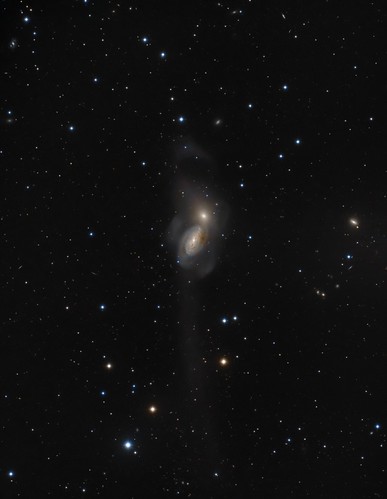 ngc 3226 and 3227 interacting galaxies with tidal tails
ngc 3226 and 3227 interacting galaxies with tidal tails by
Onejoshsmith, on Flickr
copyright: Josh Smith processing
copyright: Josh Smith and Craig Smith Image Acquisition
Messier 46 (and NGC 2438)
Posted: Thu Feb 18, 2016 8:23 pm
by aldomottino
M 46 in RGB was captured from Rosario, Argentina.
The planetary NGC 2438, shown with more detail in the inset, was captured from Bosque Alegre Observatory, Córdoba, and integrates RGB with Ha.
Picture 1: Credits and Copyright: Aldo Mottino (Rosario), Argentina.
Picture 2: Credits and Copyright: Aldo Mottino (Rosario) and Carlos Colazo (EABA, UNC, Córdoba), Argentina.
Re: Submissions: 2016 February
Posted: Fri Feb 19, 2016 1:07 am
by MikeBJ
Copyright Mike and Trish Berthon-Jones
Original image (2MB) at
http://www.mikeberthonjones.smugmug.com ... 010hrs.jpg
A nebula created by the stellar wind of a super-hot Wolf-Rayet star slamming into pre-existing material. Note the loculated bubble-within-bubble structures in the wall of the nebula toward 2 o'clock, and other fainter [OIII] shock fronts toward 9 o'clock. As befits a WR in relatively young pre-existing material, rather than an SNR in multiply regurgitated star-stuff, there was very little [SII] in this image, hence the green background.
Red: [SII] 10hrs, Green: H-alpha 5hrs, Blue: [OIII] 6hrs, all in 1hr 1x1 subs. Aspen CG16M at -30C on 20" PlaneWave. All observatory control and image processing software written by MBJ. Euchareena, rural NSW, Australia, 660 metres. Half moon.
Our other stuff at
http://www.MikeBerthonJones.smugmug.com
Re: Submissions: 2016 February
Posted: Fri Feb 19, 2016 9:59 pm
by Guest
Cathedral - Évora
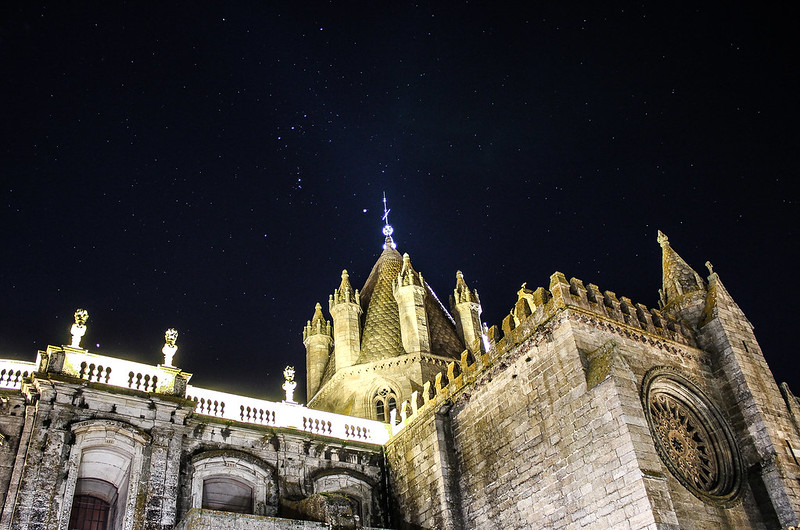 Cathedral - Évora
Cathedral - Évora by
Cédric Pereira, no Flickr
Re: Submissions: 2016 February
Posted: Sat Feb 20, 2016 4:37 am
by Florian kainz
All of the six planets that are visible with the naked eye, in one panoramic picture, shot about one hour before sunrise on February 9th in the Marin Headlands, just north of San Francisco, California:
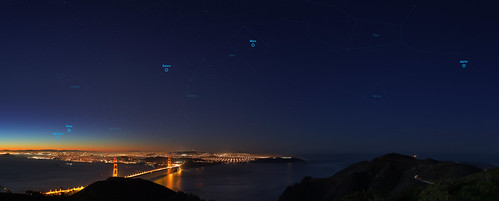 Five Planets in the Sky
Five Planets in the Sky by
fksr, on Flickr
High-resolution version is here:
https://c2.staticflickr.com/2/1640/2480 ... 5189_o.jpg
A version without annotations:
https://c2.staticflickr.com/2/1445/2480 ... 35d2_o.jpg
Dust cloud of Cepheus
Posted: Sun Feb 21, 2016 8:05 am
by Kapkowski
New processing.
Two panel mosaic including VdB 150, VdB 152 , DeHT 5 and many others.
Technical details at Astrobin.

Re: Submissions: 2016 February
Posted: Sun Feb 21, 2016 12:17 pm
by pisto92
22 degree moon halo as energy sphere
Copyright: Andrea Pistocchini
Re: Submissions: 2016 February
Posted: Sun Feb 21, 2016 2:20 pm
by Raffaele Barzacchi
This is my submission for the APOD in
FULL RESOLUTION:
http://www.raffaelebarzacchi.com/galler ... d_barz.jpg

Here is a special sunrise on the most famous triade of the lunar surface. The details and resolved structures are many and very interesting, probably the highest performed by an amateur telescope.
Very pertinent is the comment of Charles A. Wood (Lunar Scientist):
http://www.astronet.ru:8105/db/msg/1200344
"The floor of Ptolemaeus is famous for its shallow depressions called saucers. But this extremely low sun and high resolution view shows that the floor has a lot more features than have been generally reported. The two biggest craters on the floor are the fresh, 10 km wide Ptolemaeus A (Ammonius) and Ptolemaeus B, a saucer. The northern portion of the floor has ejecta debris from Herschel (HEj on mouseover). The rest of the floor seems to have two or three regions with different surface roughness. The most smooth material (S1) occurs along the NW edge of the floor - the white line marks its extent. The western edge of the floor is not as smooth as S1 but is less textured than the rest of the floor - I've labeled it S2. Some ridges - traced with short white lines - are just south of Ptolemaeus A and to the west of it. Another set of ridges are north of the crater S. Lunar Orbiter IV images do not show most of these low features but do reveal that definitely S1, and maybe S2, have a lower number of small superposed craters. This implies that the smooth areas are younger than the rest of the floor. The generally accepted interpretation is that the fill within Ptolemaeus is pulverized, perhaps fluidized, ejecta from the Imbrium-forming impact. This interpretation is weakened if the floor has different age units. The ridges west of the crater A are reminiscent of lava flow levees, and with only a little imagination it could be speculated that remnants of smooth material still exist at the end of the levees. This speculation says that the interior includes individual flow units of a lava-like material, emplaced after any Imbrium ejecta, and perhaps later than the debris from the Eratosthenian age crater Herschel. This is all pretty exciting!"
Image data:
The image is a mosaic made up of 4 captured files, the time UT is the intermediate to 4 files.
Place and date of capture: Bargone (Genoa) - Italy, 07 April 2014, 20:42 U.T.
Telescope: Dobson 18"
CCD: ASI120MM
Filter: IR filter 685nm
Processed in February 2016
Re: Submissions: 2016 February
Posted: Sun Feb 21, 2016 5:42 pm
by marioweigand
Re: Submissions: 2016 February
Posted: Sun Feb 21, 2016 8:41 pm
by felopaul
IC417 & NGC 1391
full size :
http://www.cielboreal.com/galerie/photo62f.jpg
total frame 106Hr done with AP155 on Paramount MX
http://www.cielboreal.com
Copyright: Cielboreal Team with J.C CANONNE, P. BERNHARD, D. CHAPLAIN & L. BOURGON
Re: Submissions: 2016 February
Posted: Mon Feb 22, 2016 10:51 am
by Petr H.
Celestial X from both hemispheres
Copyright: Petr Horálek / ESO
Image(s) in higher resolutions and full explanation:
http://www.astronom.cz/horalek/?p=2149
http://www.eso.org/public/images/potw1608a/
Milky Way and Zodiacal Light seen (captured) from both hemispheres in same season, giving full view to the surrounding of the Sun observed from the Earth. As seen from Earth on January, the Sun is projected (bellow the horizons) close to the center of Milky way. In the time, the disc of zodiacal dust is giving view to the zodiacal light like a second band glowing from the horizon (in evening time of night from northern hemisphere, morning time of night from southern hemisphere). The angle between Milky Way and Zodiacal Light is 60.2 deg. Southern part was taken from Paranal Observatory, while the northern from Slovakian village Oravska Lesna.
North-South Orientation
South-North Orientation (ESO)
Jupiter, Oval Ba - February 21st
Posted: Mon Feb 22, 2016 2:28 pm
by Efrain Morales
Jupiter, Oval Ba (limb) and the moon Io just transiting on February 21st, 05:01, 05:09, 05:49ut.
Re: Submissions: 2016 February
Posted: Mon Feb 22, 2016 2:29 pm
by joelshort
California in Narrowband and Broadband Light
http://www.buckeyestargazer.net
Copyright: Joel Short
Saturn - February 21st
Posted: Mon Feb 22, 2016 2:34 pm
by Efrain Morales
Saturn on February 21st, 10:11ut.
Re: Submissions: 2016 February
Posted: Mon Feb 22, 2016 2:42 pm
by moonrocks
70 light hours closer to Orion "The Space Walk"
The data used to create this amateur image was produced over a period of two months from my home observatory in Valencia.
Copyright: Paul C Swift
Original image
http://moonrocksastro.com/wp-content/up ... -JPG-1.jpg
Whirpool galaxy
Posted: Mon Feb 22, 2016 9:06 pm
by alcarreño
Copyrights: Raul Villaverde Fraile
30x600" RGB
30x600" halfa
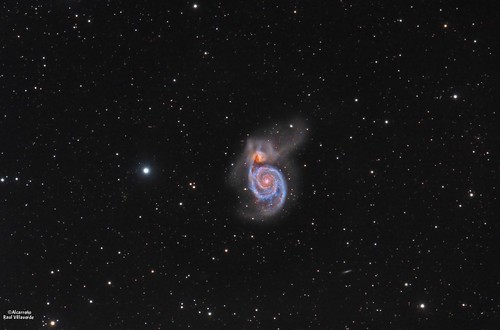 Messier 51 Focal 8 Halfa
Messier 51 Focal 8 Halfa by
Raul Villaverde, en Flickr
Re: Submissions: 2016 February
Posted: Mon Feb 22, 2016 10:16 pm
by David_Forteza
24 images form this panorama
we were lucky that one of them was captured a meteor. The camera may have been aiming elsewhere, but shot it at the right time.
It is a mosaic of 24 images, real, without tricks or traps. Canon 6D - 24X20 "- 24mm@F2.8
Copyrights: David Forteza - Raul Villaverde - Domingo Pestana
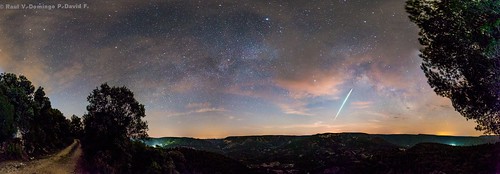 Bolido junto Via Lactea desde la Alcarria
Bolido junto Via Lactea desde la Alcarria by
David Forteza, en Flickr
Full resolution:
https://flic.kr/p/tmhjcr
Anothers panoramas:
Milky Way - Ligh Polution - Air Glow
Copyrights: David Forteza
 Reprocess Air-Glow
Reprocess Air-Glow by
David Forteza, en Flickr
Full resolution:
https://flic.kr/p/CN43TS
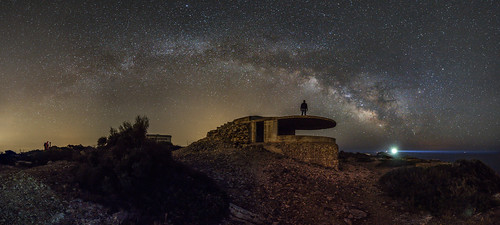 Panoramica Nido de Aguilas
Panoramica Nido de Aguilas by
David Forteza, en Flickr
Full resolution:
https://flic.kr/p/uVXQcb
Individual frame:
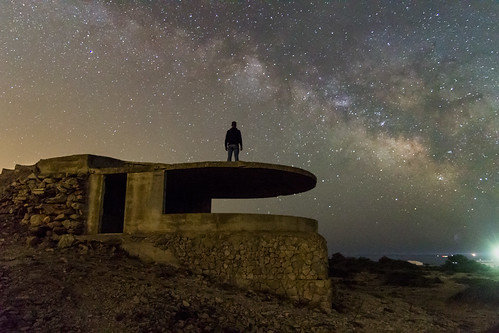 Reprocesado al canto
Reprocesado al canto by
David Forteza, en Flickr
Full resolution:
https://flic.kr/p/C9K7tq
Re: Submissions: 2016 February
Posted: Mon Feb 22, 2016 11:24 pm
by randallx200
Full moon rising over the 13th century castle of Mayoralgo and storks, Cáceres, Spain.
Takahashi FS60-C and Canon 40D
Re: Submissions: 2016 February
Posted: Tue Feb 23, 2016 4:20 am
by mdieterich
Mt. Rainier National Park Milky Way with Portland, OR light pollution
http://www.mdieterichphoto.com
Copyright: Matt Dieterich
https://c2.staticflickr.com/2/1697/2518 ... bf80_h.jpg
Some nights can be very surprising when out under the stars. This particular night a lovely fog rolled through the valley across from the Paradise parking lot at Mount Rainier National Park to add an interesting element to this photo. The Milky Way core is seen rising over the Tatoosh Mountains above the massive yellow glow of light pollution from Portland, OR about 70 miles away. I used my Nikon D750, 24mm F/1.4, iso 5000, and 15 seconds.
The color of the deep
Posted: Tue Feb 23, 2016 8:10 am
by alcarreño
Copyrights: Raul Villaverde Fraile
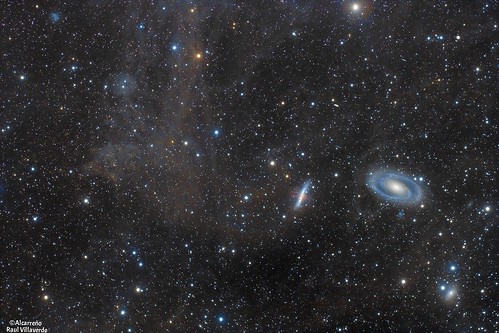 IFN 2016v3
IFN 2016v3 by
Raul Villaverde, en Flickr
M42 and dust
Posted: Tue Feb 23, 2016 11:59 am
by IanP
M42 and dust: repro with HDRM
 ngc 3226 and 3227 interacting galaxies with tidal tails by Onejoshsmith, on Flickr
ngc 3226 and 3227 interacting galaxies with tidal tails by Onejoshsmith, on Flickr Five Planets in the Sky by fksr, on Flickr
Five Planets in the Sky by fksr, on Flickr
 Messier 51 Focal 8 Halfa by Raul Villaverde, en Flickr
Messier 51 Focal 8 Halfa by Raul Villaverde, en Flickr Bolido junto Via Lactea desde la Alcarria by David Forteza, en Flickr
Bolido junto Via Lactea desde la Alcarria by David Forteza, en Flickr Reprocess Air-Glow by David Forteza, en Flickr
Reprocess Air-Glow by David Forteza, en Flickr Panoramica Nido de Aguilas by David Forteza, en Flickr
Panoramica Nido de Aguilas by David Forteza, en Flickr Reprocesado al canto by David Forteza, en Flickr
Reprocesado al canto by David Forteza, en Flickr